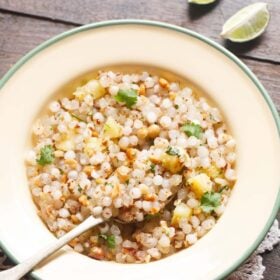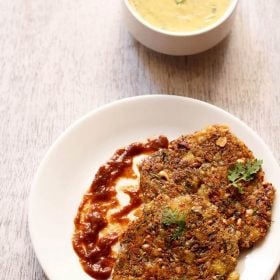Sabudana Chivda Recipe | Sabudana Namkeen Recipe | Sabudana Snacks
If there’s one ingredient that’s ubiquitous in the food prepared during fasts or vrats in India, it has got to be sabudana (sago). While this Sabudana Recipes compilation will help you to make many of such yummy dishes, this post is dedicated solely to this crunchy, munchy and scrumptious Sabudana Chivda Recipe. This Sabudana Namkeen with minimal ingredients, is not just easy and quick to make but also is vegan and the perfect snack for the Navratri fasting season.
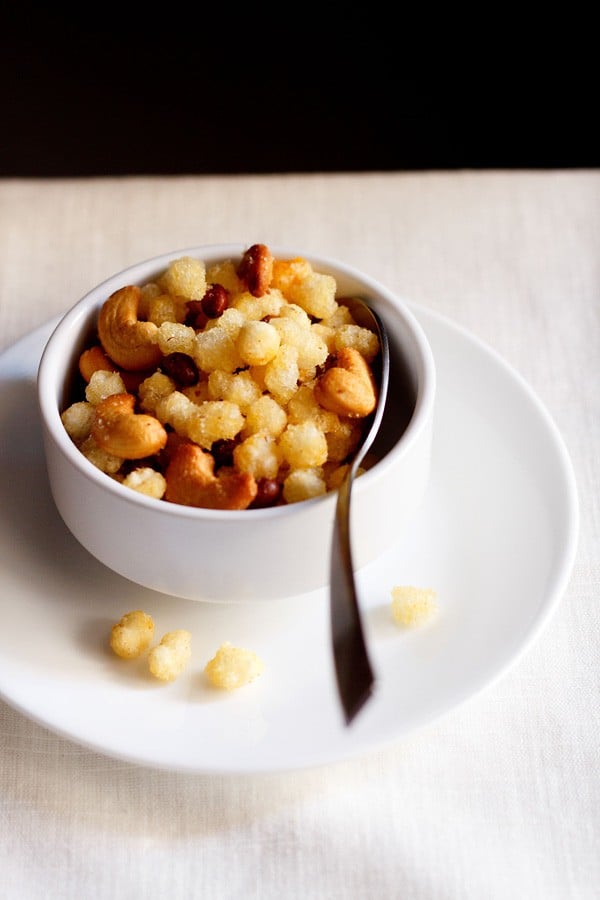
When I say that you don’t have to wrack your brains much with the ingredient list for this recipe of Sabudana Namkeen, I truly mean it. Besides the sabudana, all you need is some peanuts, cashews, raisins, red chili powder, powdered sugar and rock salt, to make it vrat-friendly. If not, then you can use regular salt too. Also, oil to fry.
However, one thing to keep in mind while making this Sabudana Chivda is that you would need the nylon sabudana pearls of the larger variety. These are also translucent. The regular sabudana pearls won’t work or give you the desired result.
In India, nylon sabudana is available in Reliance stores or even online. You may even get them at your local grocery shop. These days many homegrown food brands also sell good quality and organic nylon sabudana. If you know any, then do go for them.
To spice up this Sabudana Namkeen, you can use spice powders that are used in Navratri Fasting. I have added a bit of red chili powder since we do use it in the religious fasting during Navratri. The sugar added in this snack perfectly balances out the spiciness and makes it tastier.
If you don’t use red chili powder at your place, then fry green chilies in oil and add in this recipe of Sabudana Chivda. Another option to get the required heat in this snack is by adding black pepper powder in it. Store this chivda in an airtight jar or box and enjoy as a snack, whenever required.
Step-by-Step Guide
How to make Sabudana Chivda
Frying sabudana, nuts and dry fruits
1. In a metal frying strainer, take ½ cup nylon sabudana pearls. You will see the size of the pearls in the picture below. They are larger than the regular variety and are a translucent.
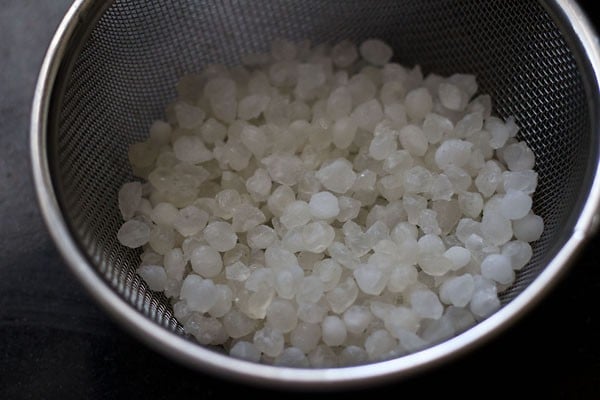
2. Heat oil for deep frying in a kadai or wok. Heat that much quantity, in which the pearls can get immersed completely. Place the metal frying strainer with 2 to 3 tablespoons sabudana pearls in the oil. Don’t over crowd, as then the frying is not even.
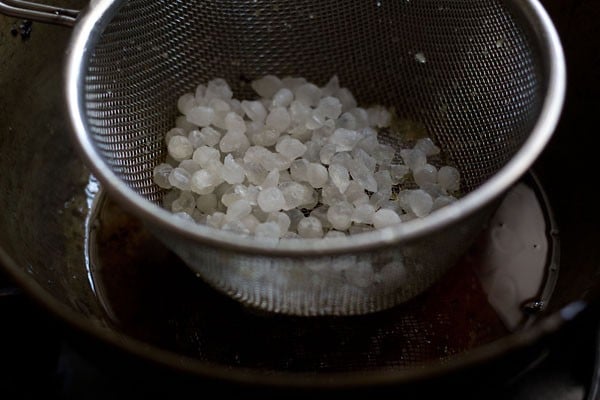
3. When the pearls come in contact with the hot oil, they will start puffing up.
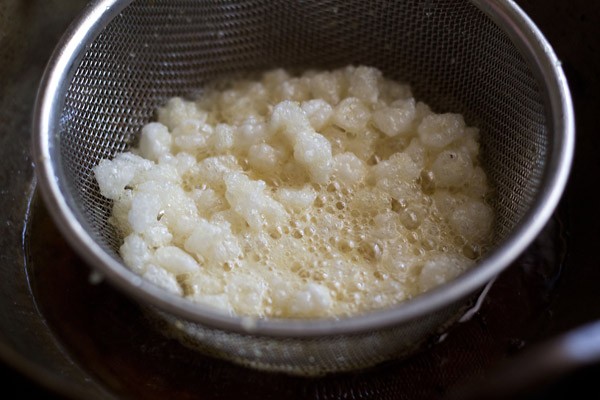
4. With a spoon, keep on turning them, so that sabudana is fried evenly in the oil.
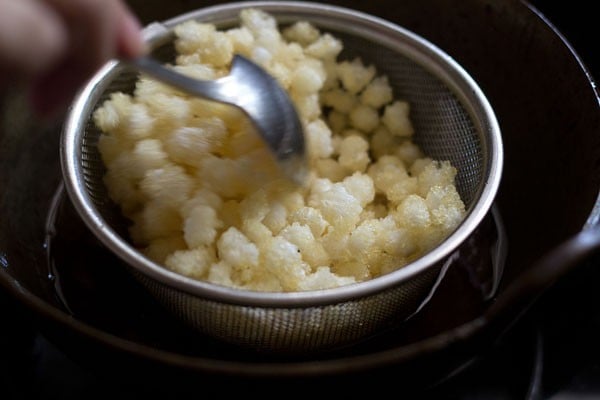
5. The sabudana pearls have to fry really well. Even if it looks crisp and done from outside, it will be hard from the center. To check for doneness, you can bite into a few pearls. If you feel they are not cooked from the center, continue to fry. Remove and drain the fried pearls on kitchen paper napkins.
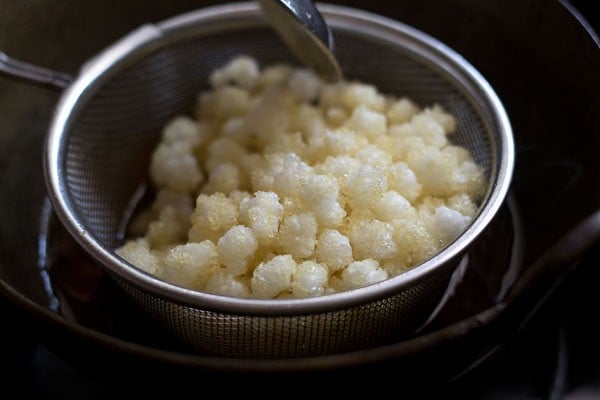
6. Now, fry ¼ cup raw peanuts the same way in the oil, till they change color and become crunchy. Similarly, fry ¼ cup cashews and ¼ cup raisins.
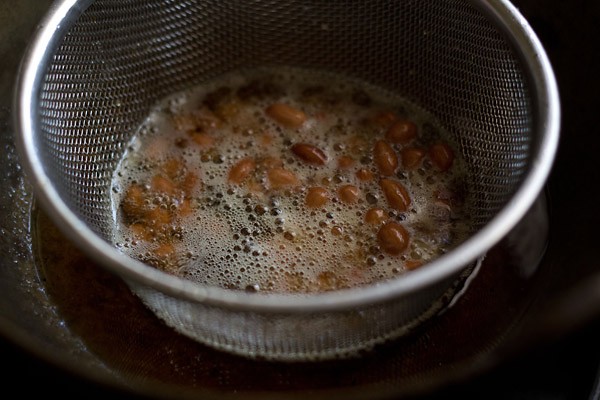
7. As soon as they are fried to a golden, drain on kitchen paper napkins.
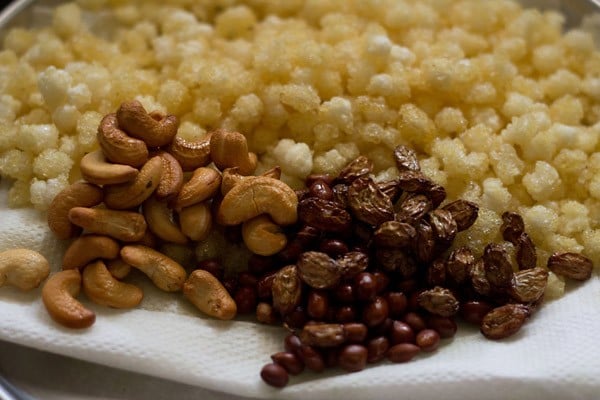
Making Sabudana Chivda
8. You can add rock salt, ½ teaspoon powdered sugar and ¼ teaspoon red chili powder and mix everything together. Or take all of the fried ingredients in a jar, once the chivda mixture becomes cool. Sprinkle, salt, powdered sugar and red chili powder.
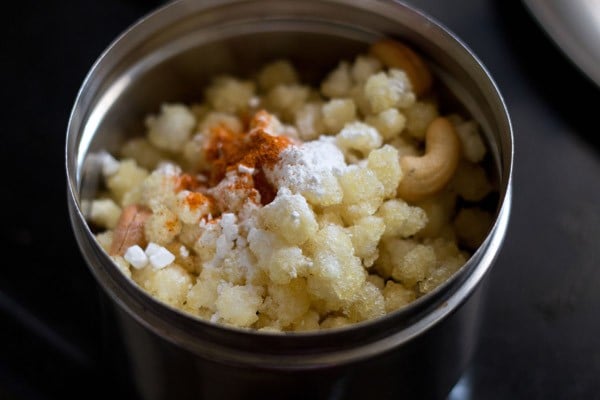
9. Cover the jar tightly and shake it, so as to mix the seasonings with the sabudana and dry fruits. Store Sabudana Namkeen at room temperature.
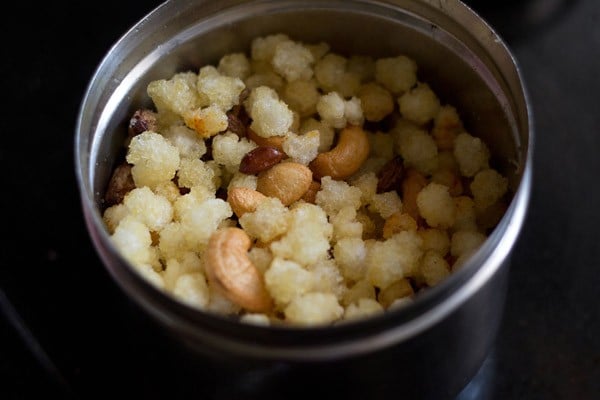
10. Serve Sabudana Chivda plain, when required.
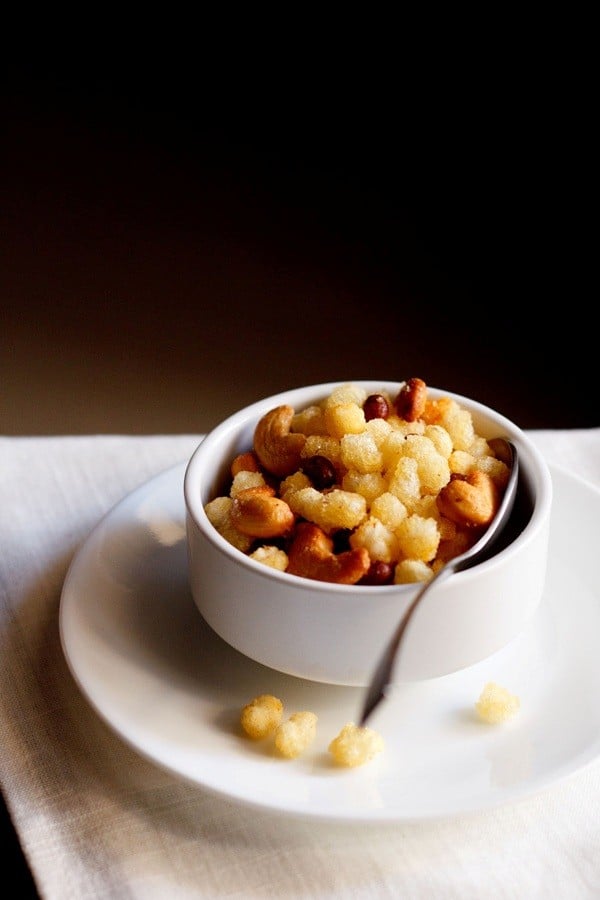
About sabudana
Call it sabudana in Hindi, sago in English or ‘sagu,’ ‘saksak,’ ‘rabia,’ etc. in other regional languages, this plant-based ingredient is a common one in Indian as well as many international cuisines. It is basically the starch that is extracted from the spongy core of numerous tropical palm trees. Thus, a great choice for food for fasting, especially during Navratri festival in India. This Sabudana Namkeen is one of the personal favorites.
However, there’s often a confusion between sago and tapioca pearls, as these are used interchangeably most of the times. The pearls that we use in cooking is the commercial form of sago. It is similar to other pearls like tapioca pearls (from the cassava plant) or even potato starch, but not the same.
To have a clear distinction between sago and tapioca pearls, you should know that if you have pearls which are off white, brittle and irregular in size, they are sago. If not, then they are tapioca pearls. Also, tapioca pearls take a longer time to cook when compared to their counterpart sago.
Just like this Sabudana Chivda, there are innumerable tasty dishes that are traditionally made with sabudana in the Indian food repertoire. These are not just salty and savory, but are decadent sweet or desserts too. Try this Sabudana Kheer to know.
Expert Tips
- If you are using green chilies instead of red chili powder, then fry them in oil and use. You can also add black pepper powder in this recipe.
- Make sure to use the larger and translucent variety of nylon sabudana for this recipe. Not the regular variety.
- While frying the sabudana, ensure immersing them completely in the hot oil and frying. For this reason, don’t overcrowd as well as then the frying is uneven too.
- For even frying, keep turning the sabudana pearls with a spoon.
- To check the doneness of the fried sabudana, bite into a few pearls. If you feel they are not cooked in the center, then continue to fry till they are properly cooked in the center too.
- You can increase the recipe proportionately for making larger batches.
More Sabudana Snacks Recipes To Try!
Navratri & Fasting Recipes
Navratri & Fasting Recipes
Navratri & Fasting Recipes
Navratri & Fasting Recipes
Please be sure to rate the recipe in the recipe card or leave a comment below if you have made it. For more vegetarian inspirations, Sign Up for my emails or follow me on Instagram, Youtube, Facebook, Pinterest or Twitter.
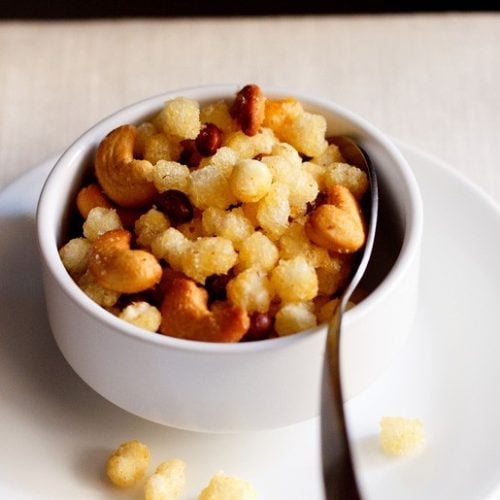
Sabudana Chivda | Sabudana Namkeen
This Nylon sabudana chivda is a crispy and tasty fasting snack made from nylon sabudana and dry fruits for the Navratri fasts.
Prep Time 5 minutes
Cook Time 25 minutes
Total Time 30 minutes
In a metal frying strainer, take the nylon sabudana pearls.
Heat oil for deep frying in a kadai/wok. Heat as much quantity, in which the pearls can get immersed completely. Place the metal frying strainer with 2 to 3 tbsp of the sabudana pearls in the oil. Don’t over crowd as then the frying is not even.
When the pearls come in contact with the hot oil, they will start puffing up.
With a spoon, keep on turning them around, so that they are fried evenly.
The pearls have to fried really well. Even if they look, crisp and done from out, they will be hard from inside. To check for doneness, you can bite into a few pearls. If you feel they are not cooked from the center, then continue to fry them. If theyremove and drain the fried pearls on kitchen paper issues.
Now fry raw peanuts the same way in the oil, till they change color and become crunchy. Similarly fry the cashews and raisins. When frying the raisins, as soon as they puff up, remove them from oil
As soon as the dry fruits are fried and golden, drain them on paper napkins.
You can add rock salt, powdered sugar and red chili powder and mix everything together. Or take all of the fried ingredients in a jar, once the chiwda mixture becomes cool. Sprinkle, salt, powdered sugar and red chili powder.
Cover the jar tightly and shake it, so as to mix the seasonings with the sabudana and dry fruits. Store sabudana chivda at room temperature.
Serve sabudana chivda plain when required.
- The recipe can be doubled or tripled.
- If using green chilies, then fry them in oil.
This Sabudana Chivda Recipe from the archives was first published in February 2014. It has been updated and republished in April 2024.

